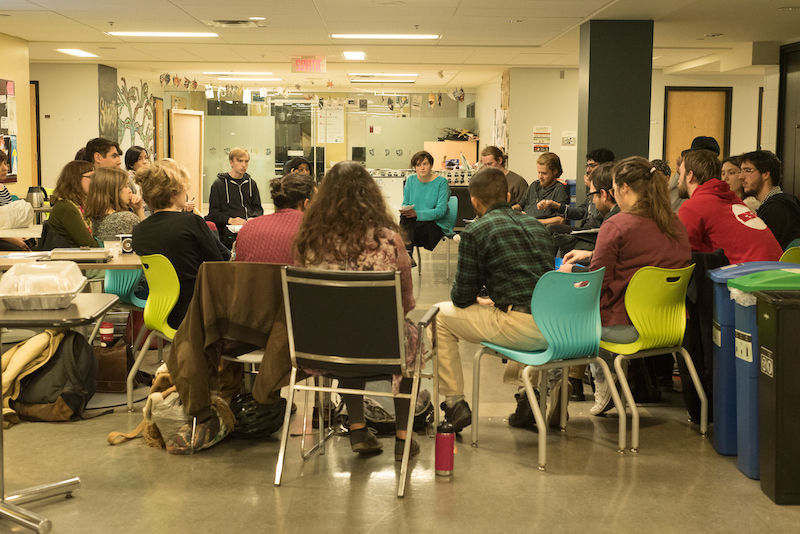Divest Concordia gears up for their upcoming referendum campaign in November
Divest Concordia discussed plans for their upcoming referendum campaign starting Nov. 1, where students will vote if they want Concordia to divest from fossil fuels––a victory in the referendum will oblige the Concordia Student Union (CSU) to officially endorse the movement. The final decision, however, still rests with the school’s administration.
At a meeting on Oct. 27, Divest Concordia members brainstormed strategies to promote the “Yes” side of the referendum. Members proposed ideas such as classroom visits, open letters to the student press and information booths.
Divest Concordia will begin campaigning from Nov. 1 until Nov. 14, followed by polling taking place between Nov. 15-17.
“We do believe that support will lean significantly on the side of divestment,” said Eamon Toohey, a spokesperson for the campaign. He praised the global divestment movement as being “not just environmentally necessary but economically sound and feasible.”
The Concordia University Foundation has already diverted $5 million to a Sustainable Investment Fund as a pilot project. In an interview with Business News Network in March 2015, the foundation’s president, Bram Freedman, confirmed that this fund had outperformed the rest of the university’s funds since its creation in 2014. He cited the poor market performance of oil and gas as a possible cause. “Given the performance in the oil and gas industry in the last little while, our sustainable investment fund is outperforming our regular fund,” said Freedman in the interview.
Other issues related to the divestment movement were discussed at the meeting, including a discrepancy between investment figures given by Divest Concordia and those provided by the university. Divest, citing research by Concordia part-time sociology and anthropology professor Erik Chevrier, said the university currently has about $12 million invested in fossil fuels. However, the Concordia University Foundation’s annual report lists the university’s total energy investments as only $1.9 million in 2015.
According to Marcus Peters, a Divest Concordia spokesperson, this figure of $12 million is partially based on estimates of how much third-party firms invest in fossil fuels. “[Concordia] started to have other firms handle their investments, and those don’t actually have to disclose their investment portfolio,” he explained. “So there’s a huge transparency issue going on there because we don’t actually know what it’s invested in, and I don’t think [the administrators] do either.”

In September, The Concordian met with Concordia President Alan Shepard and discussed divestment within Concordia. “We’re the first Canadian university to set aside some funds that were not invested in the fossil fuels sector,” said Shepard. “Other institutions followed soon after we made that move.”
The first move of divestment was made in December 2014, university spokesperson Chris Mota said at the time. “In time we will add to it,” said Shepard.
The global divestment movement has diverted $3.4 trillion worth of investments from the fossil fuel industry to date, according to gofossilfree.org. However, this gesture is largely symbolic because companies are not directly affected financially by the trading of their stock—a diversion of $3.4 trillion does not indicate a $3.4 trillion loss for the industry. However, as Peters explained, “The point isn’t to economically bankrupt them, it’s to politically and socially bankrupt them.”
Peters also noted that promoting competing industries can have financial consequences for fossil fuel companies. “Half of it is getting [institutions] to divest, but the other half is getting them to invest in [socially responsible companies], in the new social economy, in the renewable economy. So that’s one way you could see marginal gains being made financially against the industry, by helping to prop up the alternative.”
With files from Savanna Craig




